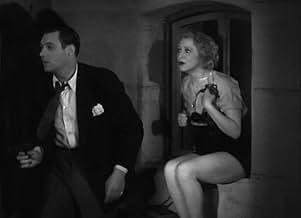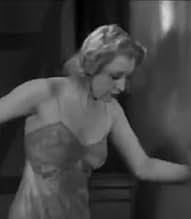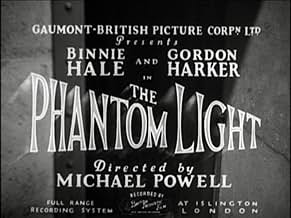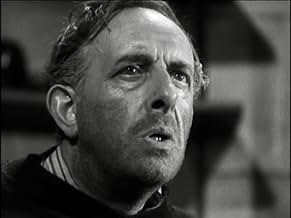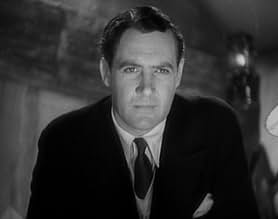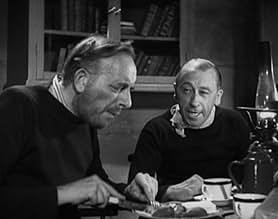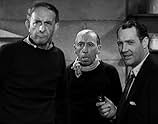Agrega una trama en tu idiomaA lighthouse keeper has been murdered in mysterious circumstances and, during the ensuing investigation a Phantom Light keeps appearing at the scene of his death.A lighthouse keeper has been murdered in mysterious circumstances and, during the ensuing investigation a Phantom Light keeps appearing at the scene of his death.A lighthouse keeper has been murdered in mysterious circumstances and, during the ensuing investigation a Phantom Light keeps appearing at the scene of his death.
- Dirección
- Guionistas
- Elenco
Anthony Holles
- Mr. Mason
- (sin créditos)
Ernest Jay
- Railway Worker
- (sin créditos)
Vi Kaley
- Woman in Pub
- (sin créditos)
John Singer
- Cabin Boy
- (sin créditos)
Opiniones destacadas
I didn't expect much from this obscure film and that was the right approach.
The film's pace is a big letdown - it's consistently slow from beginning to end. The scriptwriters couldn't have been bothered with the development of the story, as it is never made clear what is going on.
Gordon Harker does quite well and tries his best to enliven the proceedings but it's all in vain.
Michael Powell has completely grown past the early, awkward stages of the sound era and can now use sound to create interesting soundscapes in service to atmosphere. This is easily his most atmospheric film to date which is unfortunately tied to a script that just doesn't quite work. There are too many outside views of the remote community centered around the coastal lighthouse and not enough from the inside, making it a mystery to such a level that it's hard to grasp what the mystery is even about. Still, that atmosphere really does help things.
Sam Higgins (Gordon Harker) arrives at Tan-Y-Bwlch in Wales to take up his position as chief lighthouse keeper after the mysterious death of its previous occupant of the role, Jack Davis. Really, he just disappeared. At the train station, he meets Binnie (Alice Bright) from out of town who's waiting for a car into town. In town, he also meets a man who lets himself be known as a journalist, Jim (Ian Hunter), who tries to bribe his way onto the lighthouse island, a bribe that Sam easily swats away. He's a twenty-five year man, you see. At the lighthouse, he meets his main helper, Claff Owen (Herbert Lomas), a local with many eerie tales of the eponymous light that shines out some nights and leads ships to their death on the rocks.
So, my problem with this is ultimately that Sam isn't there to investigate anything but Binnie and Jim are, but under false pretenses. Sam is mostly just trying to get through his first night, and he's never flustered. He's too experienced for anything else. The one fact that should fluster him, the presence of a half-mad former helper, Tom (Reginald Tate), that Sam ends up tying up to control. Sam isn't interested in the mystery. Instead, Binnie and Tom end up on the island when Tom takes a boat and demands help in the night, a boat on which Binnie had stowed-away. They both have secret interests for investigating the circumstance of Jack Davis' disappearance, but they keep them from each other, from Sam, and from the audience until pretty much the film's ending.
So, we have our main character who's essentially just managing the mess, two supporting characters who are searching for truth but we don't understand any of it, and Claff in the middle talking about the phantom light while Tom tries to escape from his bonds. It's a weird muddle where I was unsure of what was even going on, the whole thing really only held up by that atmosphere. That atmosphere is helped by this constant whirl of wind, the crashing of waves, and the wonderfully naturalistic photography that Powell uses to help set the scene, especially as Sam is approaching the lighthouse. The set on which most of the film takes place is claustrophobic but brightly lit so that we can see everything (it could have used a bit more moodiness in the lighting inside).
And then everything gets revealed. It's a money scheme that's never quite clear but involves the wrecking of ships, a naval officers brother, and the death of Jack. Even how far the conspiracy goes ends up unclear, but the action itself around the resolution is clear enough to function.
If I were given this script, I'd rewrite at least one of those three outsider roles to be from the village, most likely Binnie. Her secret identity ends up not really mattering in the long run, and the lack of any real connection to the village makes everything about it extremely opaque for far too long. Instead, make Binnie Jack's brother or daughter, or something. She knows everyone, but she can't get onto the island for whatever reason. She ends up being able to provide Sam with background and even a reason for him to be invested (he falls for her, maybe). Then we can touch on, perhaps, a conspiracy in the town that she has some sense of but no real specific knowledge of, and someone like Claff or even Tom or Jim could help fill out the details.
So, the mystery is far too opaque for far too long, but the atmosphere really does help, especially since the focus is a bit more sensational in the experience rather than about the details of the mystery. It really would have helped the film overall to have greater clarity around its central narrative. So, it's a mix, not quite successful, but pretty consistently interesting.
Sam Higgins (Gordon Harker) arrives at Tan-Y-Bwlch in Wales to take up his position as chief lighthouse keeper after the mysterious death of its previous occupant of the role, Jack Davis. Really, he just disappeared. At the train station, he meets Binnie (Alice Bright) from out of town who's waiting for a car into town. In town, he also meets a man who lets himself be known as a journalist, Jim (Ian Hunter), who tries to bribe his way onto the lighthouse island, a bribe that Sam easily swats away. He's a twenty-five year man, you see. At the lighthouse, he meets his main helper, Claff Owen (Herbert Lomas), a local with many eerie tales of the eponymous light that shines out some nights and leads ships to their death on the rocks.
So, my problem with this is ultimately that Sam isn't there to investigate anything but Binnie and Jim are, but under false pretenses. Sam is mostly just trying to get through his first night, and he's never flustered. He's too experienced for anything else. The one fact that should fluster him, the presence of a half-mad former helper, Tom (Reginald Tate), that Sam ends up tying up to control. Sam isn't interested in the mystery. Instead, Binnie and Tom end up on the island when Tom takes a boat and demands help in the night, a boat on which Binnie had stowed-away. They both have secret interests for investigating the circumstance of Jack Davis' disappearance, but they keep them from each other, from Sam, and from the audience until pretty much the film's ending.
So, we have our main character who's essentially just managing the mess, two supporting characters who are searching for truth but we don't understand any of it, and Claff in the middle talking about the phantom light while Tom tries to escape from his bonds. It's a weird muddle where I was unsure of what was even going on, the whole thing really only held up by that atmosphere. That atmosphere is helped by this constant whirl of wind, the crashing of waves, and the wonderfully naturalistic photography that Powell uses to help set the scene, especially as Sam is approaching the lighthouse. The set on which most of the film takes place is claustrophobic but brightly lit so that we can see everything (it could have used a bit more moodiness in the lighting inside).
And then everything gets revealed. It's a money scheme that's never quite clear but involves the wrecking of ships, a naval officers brother, and the death of Jack. Even how far the conspiracy goes ends up unclear, but the action itself around the resolution is clear enough to function.
If I were given this script, I'd rewrite at least one of those three outsider roles to be from the village, most likely Binnie. Her secret identity ends up not really mattering in the long run, and the lack of any real connection to the village makes everything about it extremely opaque for far too long. Instead, make Binnie Jack's brother or daughter, or something. She knows everyone, but she can't get onto the island for whatever reason. She ends up being able to provide Sam with background and even a reason for him to be invested (he falls for her, maybe). Then we can touch on, perhaps, a conspiracy in the town that she has some sense of but no real specific knowledge of, and someone like Claff or even Tom or Jim could help fill out the details.
So, the mystery is far too opaque for far too long, but the atmosphere really does help, especially since the focus is a bit more sensational in the experience rather than about the details of the mystery. It really would have helped the film overall to have greater clarity around its central narrative. So, it's a mix, not quite successful, but pretty consistently interesting.
There's a nice undercurrent of comedy running through this otherwise standard mystery story. Set in a "haunted" lighthouse on the supposedly lonely Welsh coast, there seems to be a remarkable crowd of characters bumping into each other at every turn. The plot starts out promisingly with much talk of ghostly terror, but settles into a rather lame and predictable conclusion.
The local Welsh villagers are mercilessly satirized as dim-witted, inbred provincials, in contrast with the smarty pants Londoners who've dropped in to sort out this here ghostly nonsense. An apparently nymphomanic young blonde with no relevance to the story other than removing various items of clothing as things progress, adds to the sly humour.
There's lots of excellent location cinematography of craggy Welsh rocks and crashing waves to provide a suitably moody background.
Taking all these elements together, I came away mildly entertained, although not mentally stimulated. Good late night fun.
The local Welsh villagers are mercilessly satirized as dim-witted, inbred provincials, in contrast with the smarty pants Londoners who've dropped in to sort out this here ghostly nonsense. An apparently nymphomanic young blonde with no relevance to the story other than removing various items of clothing as things progress, adds to the sly humour.
There's lots of excellent location cinematography of craggy Welsh rocks and crashing waves to provide a suitably moody background.
Taking all these elements together, I came away mildly entertained, although not mentally stimulated. Good late night fun.
In '30's British films I've always liked the mix of pithy Music Hall humour, mild ghostliness, a frisson of sex, and manly London chaps saving the day, all displayed perfectly in the Phantom Light. Director Michael Powell's best stuff was yet to come of course, but this can be seen as him still learning his craft practising with more inconsequential trifles.
Gordon Harker here shines with some cracking comedy lines handed to him, as the new lighthouse-keeper at a rather ... insular Welsh coastal village, apparently 200 years behind the times with Wrecking ships on the rocks still big business. Ian Hunter is the manly Londoner with all the brains ... er, I think this was his last British film until after the War ended. He was the best King Richard Hollywood ever had! Until the last reel Binnie Hale has no brains but admirably compensates with long legs. Herbert Lomas perfects the character he particularly re-used later in Ask a Policeman and The Ghost Train - he was even back in Powell & Pressburger's I Know Where I'm Going! But the film that borrowed the most from this was Arthur Askey's Back Room Boy from '42, it even looked the same inside the lighthouse!
A pleasant 75 minutes spent in the company of familiar faces and story.
Gordon Harker here shines with some cracking comedy lines handed to him, as the new lighthouse-keeper at a rather ... insular Welsh coastal village, apparently 200 years behind the times with Wrecking ships on the rocks still big business. Ian Hunter is the manly Londoner with all the brains ... er, I think this was his last British film until after the War ended. He was the best King Richard Hollywood ever had! Until the last reel Binnie Hale has no brains but admirably compensates with long legs. Herbert Lomas perfects the character he particularly re-used later in Ask a Policeman and The Ghost Train - he was even back in Powell & Pressburger's I Know Where I'm Going! But the film that borrowed the most from this was Arthur Askey's Back Room Boy from '42, it even looked the same inside the lighthouse!
A pleasant 75 minutes spent in the company of familiar faces and story.
Gordon Harker arrives at the tiny Welsh village where everyone seems to be named Owen. He's to take over the light house in the bay. He listens to stories about the Ghost Light that led the two earlier masters to their death: the light goes out, another one appears, and guides a ship onto the rocks. "Wreckers" he says, and thinks no more of it. He also doesn't think much of Ian Hunter, who claims to be a reporter and offers him lots of money to go to the lighthouse, nor of Binnie Hale, who also makes the same request. He's proud of his 25 years in the service, and runs things by the book. When he gets to the house, there's a helper who's being tended to by doctor Milton Rosmer. Most of the time he's out, but occasionally he gets up and tries to kill someone with his bare hands.
It's a nicely opened version of the stage play by Evadne Price and Joan Roy Byford., with some nice location shooting in th west counties and Wales. It makes me wonder if this was the inspiration for dirctor Michael Powell to wander the island, far from London, and look at the weird and wonderful way people live far from London.
It's a nicely opened version of the stage play by Evadne Price and Joan Roy Byford., with some nice location shooting in th west counties and Wales. It makes me wonder if this was the inspiration for dirctor Michael Powell to wander the island, far from London, and look at the weird and wonderful way people live far from London.
¿Sabías que…?
- TriviaWhen Alice Bright (Binnie Hale) remarks that she had just been performing in a play, Sam Higgins (Gordon Harker) retorts, "East Lynne?" This is a reference to the oft produced play and movie of Mrs. Henry Wood's novel of the same name. "East Lynne" was enjoyed for its mad plot and frequently incomprehensible dialogue.
- ErroresSam Higgins arrives at Tan y Bwlch to take a boat to the North Stack lighthouse offshore. Both places exist but are about 60 miles apart. Tan y Bwlch is on the shore of a reservoir, not the sea, and North Stack lighthouse, on the isle of Anglesey, is onshore, not off.
- Citas
Alice Bright: Mr Higgins. I'm going to tell you the truth. I'm an actress, hiding from the police.
Sam Higgins: What, you act as bad as all that?
- ConexionesFeatured in Hecho en Inglaterra: Las películas de Powell y Pressburger (2024)
Selecciones populares
Inicia sesión para calificar y agrega a la lista de videos para obtener recomendaciones personalizadas
Detalles
- Tiempo de ejecución
- 1h 16min(76 min)
- Color
- Relación de aspecto
- 1.37 : 1
Contribuir a esta página
Sugiere una edición o agrega el contenido que falta

